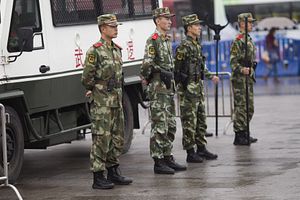On November 13, gunmen and bombers affiliated with Islamic State (ISIS) attacked Batalcan Theater, cafes, restaurants, and the Stade de France in Paris, killing 129. A week later, armed gunmen took 170 hostages in the Radisson Blu hotel in Mali’s capital, Bamako. In between, ISIS announced that it had executed two hostages, a Norwegian and a Chinese citizen.
Each of these events impacted China directly. One Chinese citizen was shot but survived the Paris attacks; three Chinese were killed in the Mali hotel attack; and hostage Fan Jinghui’s murder was confirmed by China’s Foreign Ministry.
After the events of the past two weeks, China has being facing more pressure – both domestically and internationally – to clarify its contributions to the fight against terrorism. Government officials, from ministry spokespeople to Xi Jinping himself, have been clear cut about China’s revulsion toward terrorism. The question is how China plans to fight it.
One thing is clear: an American-style “war on terror,” with military operations overseas designed to attack and overrun terrorist strongholds, is not in the cards for Beijing. China’s non-interventionist foreign policy wouldn’t necessarily prevent China from sending its military to help fight terrorist groups like ISIS, if (and only if) the host country requests it. But even countries that have openly asked for China’s aid, such as Iraq, have received only promises of personnel training and other support. China simply isn’t interested in placing boots on the ground (or missile in the air, for that matter) to fight international groups like ISIS. And given how little effect military strikes against ISIS have had so far (and the mixed results of the long-standing U.S. operations against the Taliban in Afghanistan), it’s easy to understand how Beijing reached that decision.
But the question remains: if China doesn’t subscribe to a literal war on terror, how does it propose to contribute to the global effort to eradicate terrorism, which Chinese leaders vocally supported over the past two weeks?
When asked to specify how China will work with the international community to fight terrorism, Foreign Ministry spokesperson Hong Lei was predictably vague, but did offer some hints toward China’s next moves.
First, Hong said, “We call on all relevant parties to coordinate with each other and forge synergy under [the] UN framework.” Chinese Foreign Minister Wang Yi has also spoken of the need to coordinate the global response to terrorism through the United Nations. “The UN’s leading role should be brought into full play to combat terrorism, and a united front in this regard should be formed,” he said on the sidelines of the G-20 summit in Turkey, shortly after the Paris attacks.
Touting the UN as the overseer of global counter-terrorism operations meshes well with China’s interests. For one thing, China wants to see a UN-approved definition of terrorism – which would include China’s own issues with Uyghur separatist groups, thus ending once and for all what China sees as the West’s “double standard” toward terrorism. If the UN was recognized as the coordinator of counter-terrorist operations, it would also restrict U.S. military interventions in the name of fighting terror.
In fact, China’s vision for UN-led approach to counter-terrorism doesn’t seem to include military operations at all. As Hong told reporters on Monday, “The international community should implement relevant UN resolutions, and carry out more cooperation in blocking cross-border flow of terrorists, cutting off the secret financing channels for terrorism, and fighting cyber terrorism.” Tellingly, all of these are actions that can be accomplished through government-to-government meetings, sharing of best practices, and the other sort of achievements reached in high-level dialogues. Nowhere did Hong mention coordinating strikes or attacks on terrorists.
That’s keeping with China’s insistence that both the “root cause” and the “symptoms” of terrorism should be addressed together. In Beijing’s view the “war on terror” as exemplified by the United States focuses too much on the symptoms – eradicating militant activity – without addressing the conditions that led to terrorism.
A recent Xinhua piece outlined China’s vision for how to fight terrorism in Africa, and it had nothing to do with military operations against groups like Boko Haram, Al-Shabaab, and al-Mourabitoun (which claimed responsibility for the November 20 hotel attack in Mali). Instead the piece focused on supporting the affected states to fight their own battles against extremists, by providing “technological aid and intelligence sharing.” Xinhua also argued that, by arming rebels around the world, the West has made terrorist groups stronger, rather than weakening them.
In this light, China sees its economic outreach to Africa (and the Middle East) as steps forward in the fight against terrorism – ways to tackle terrorism at the root by eliminating poverty and providing employment for those who might otherwise be drawn to extremist groups.
Of course, China’s understanding of the “root causes” of terrorism can be called into question based on its actions in Xinjiang province, where heavy-handed security measures may actually be backfiring and increasing terrorist activity. China seems to cling to the belief that economic development can cure all ills, whether in Xinjiang, Mali, or Afghanistan — despite evidence to the contrary in China’s own far-western province. Still, Western military efforts haven’t proved much more successful either.
As China grows in prominence, and as its global interests are increasingly impacted by terrorist networks overseas, expect Beijing to become more vocal about its own strategy for fighting terror — without actually fighting.

































